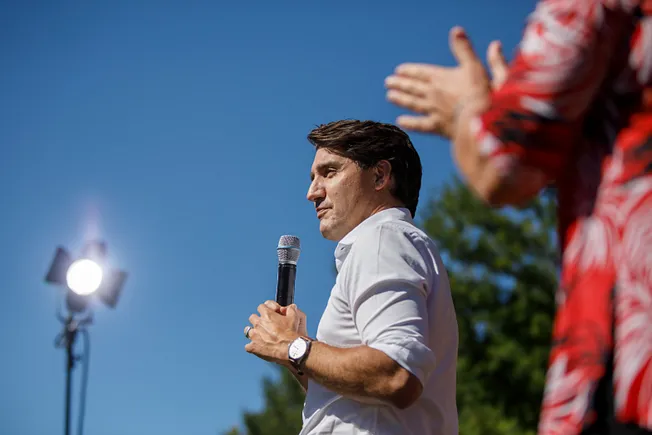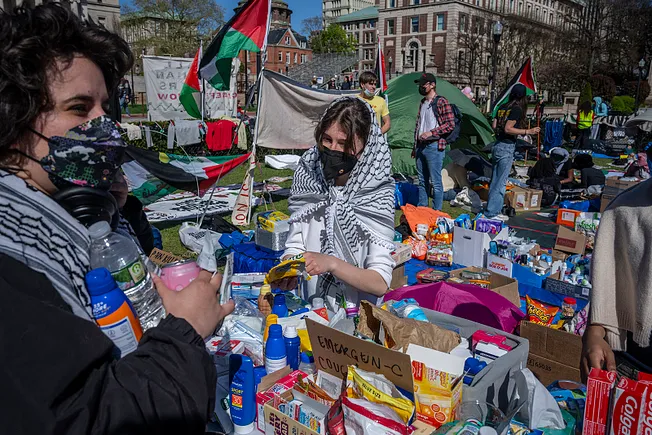On August 13, 2021, the Canadian government announced that anyone who hadn’t been vaccinated against Covid would soon be barred from planes and trains. In many cases, The Backward could no longer travel between provinces or leave the country. If you lived in Winnipeg and wanted to visit your mother on her deathbed in London or Hong Kong or, perhaps, Quebec City, you’d better get jabbed—or resign yourself to never seeing your mother again.
Jennifer Little, the director-general of COVID Recovery, the secretive government panel that crafted the mandate, called it “one of the strongest vaccination mandates for travelers in the world.”
It was draconian and sweeping, and it fit neatly with the public persona that Prime Minister Justin Trudeau had cultivated—that of the sleek, progressive, forward-looking technocrat guided by fact and reason. The Canadian Medical Association Journal, in a June 2022 article, observed that “Canada had among the most sustained stringent policies regarding restrictions on internal movement.”
But recently released court documents—which capture the decision-making behind the travel mandate—indicate that, far from following the science, the prime minister and his Cabinet were focused on politics. (Canadians are hardly alone. As Common Sense recently reported, American public-health agencies have also been politicized.)
Two days after announcing the mandate, Trudeau called a snap election—presumably expecting that his Liberal Party, which was in the minority in the House of Commons, would benefit from the announcement and be catapulted into the majority. As it turned out, the Liberals failed to win a majority in the September 2021 election. In the meantime, roughly five million unvaccinated Canadians were barred from visiting loved ones, working or otherwise traveling. (Trudeau, for his part, stayed in power. Even though the Conservatives have won the popular vote in the past two elections, because of Canada’s parliamentary system, they have been denied the top job.)
The court documents are part of a lawsuit filed by two Canadian residents against the government. Until last month, they were under seal.
Both plaintiffs are business owners. Both have family in Britain. Both have refused the vaccine on the grounds of bodily autonomy. Both were reluctant to identify their businesses out of fear of losing customers.
One plaintiff is Karl Harrison. In his affidavit, Harrison, 58, said that he and his partner, Emma, had immigrated in 2009 from Britain to Canada. (He became a Canadian citizen in 2015.) They have two children, a 24-year-old son and a 14-year-old daughter, and they live in a tony neighborhood in Vancouver. He’d always been an entrepreneur. “I was involved in establishing, owning and co-owning over 40 venues of one sort or the other—restaurants, bars, music venues and comedy clubs,” he told me. “One music venue is fairly well known, called The Bedford. Ed Sheeran got his start there.”
Since 2000, Harrison had been involved in the travel industry. “We have a company in the U.K., Ireland, Spain, and we’re the largest retailer of packages for Disneyland Paris,” he said.
He also has an 88-year-old mother in Britain, and he was furious that, for months, he couldn’t visit her. “When you’ve got oppressive government behavior,” he told me, “you’re only left with only three choices: accept it, fight it or leave. I can’t accept it. I moved my family here, and I would be letting them down if we moved away—so I’m in fight mode.”
The other plaintiff is Shaun Rickard, whose father, also in Britain, is suffering from late-stage Alzheimer’s. Rickard, 55, lives in the town of Pickering, outside Toronto, and he owns a small exterior-siding and eaves-contracting business. He portrayed himself as something of an activist. “I guess I’m the Lone Ranger,” he told me. “When I see something wrong, evil, corrupt happen, I feel I have to speak up.”
He was surprised when Trudeau announced the travel mandate. “I said to myself, ‘Holy fuck, how can this be happening here?’” He added that the only way to stop it would be “through revolution, which is never going to happen in Canada, or through the courts, and the latter is what we did.”
So, in the fall of 2021, Rickard launched a GoFundMe to do battle with his government. In November, Harrison, who had learned of Rickard on social media, reached out to him. In December, they jointly filed suit.
Rickard said that, so far, the lawsuit had cost the two plaintiffs about $186,000—of which, Rickard had raised $121,000 on GoFundMe. (In February of this year, when the Canadian government invoked the Emergencies Act in response to the truckers protesting a separate vaccine mandate in Ottawa, GoFundMe forced Rickard, like those raising money for the truckers, off the site.)
Rickard and Harrison’s attorney, Sam Presvelos, said that all government decisions related to public health demanded transparency. “Civil servants shouldn’t hide behind a shroud of secrecy,” Presvelos told me.
The whole point of the case was to lift that shroud and cast a spotlight on the unscientific basis of the mandate.
Among other things, the court documents indicate:
No one in the COVID Recovery unit, including Jennifer Little, the director-general, had any formal education in epidemiology, medicine or public health.
Little, who has an undergraduate degree in literature from the University of Toronto, testified that there were 20 people in the unit. When Presvelos asked her whether anyone in the unit had any professional experience in public health, she said there was one person, Monique St.-Laurent. According to St.-Laurent’s LinkedIn profile, she appears to be a civil servant who briefly worked for the Public Health Agency of Canada. St.-Laurent is not a doctor, Little said.
(Reached on the phone, St.-Laurent confirmed that she was a member of COVID Recovery. She referred all other questions to a government spokesperson.)
Little suggested that a senior official in the prime minister’s Cabinet or possibly the prime minister himself had ordered COVID Recovery to impose the travel mandate. (During cross-examination, Little told Presvelos repeatedly that “discussions” about the mandate had taken place at “senior” and “very senior” levels.) But she refused to say who had given her team the order to impose the travel mandate. “I’m not at liberty to disclose anything that is subject to cabinet confidence,” she said.
The term “cabinet confidence” is noteworthy because it refers to the prime minister’s Cabinet. Meaning that Little could not talk about who had directed the COVID Recovery unit to impose the travel mandate because someone at the very highest levels of government was apparently behind it.
In the days leading up to the implementation of the travel mandate, transportation officials were frantically looking for a rationale for it. They came up short.
That was made clear by an email exchange in the latter half of October 2021 between Aaron McCrorie and Dawn Lumley-Myllari. McCrorie is the associate assistant deputy minister for safety and security in Transport Canada, the department that houses COVID Recovery. Lumley-Myllari is an official in the Public Health Agency of Canada. In the email exchange, McCrorie seemed to be casting about for a credible rationale for the travel mandate. This was less than two weeks before the mandate was set to kick in.
“To the extent that updated data exist or that there is clearer evidence of the safety benefit of vaccination on the users or other stakeholders of the transportation system, it would be helpful to assist Transport Canada supporting its measures,” McCrorie wrote.
Four days later, on October 22, McCrorie emailed Lumley-Myllari again: “Our requirements come in on October 30”—in just over a week—”so need something fairly soon.”
On October 28, Lumley-Myllari replied to McCrorie with a series of bullet points outlining the benefits, generally speaking, of the Covid vaccine. She did not address McCrorie’s question about the transportation system, noting that the Public Health Agency of Canada was updating its “Public health considerations” with regard to vaccine mandates.
Two days later, on October 30, the travel mandate took effect.
Then, eight-and-a-half months later, on June 14, 2022, government officials announced that they were suspending the mandate—although they made it clear that they could bring it back at any time.
Within days, government lawyers filed a motion seeking to shut down Harrison and Rickard’s suit on the grounds that it was now moot—and, Presvelos said, to make sure the public never saw the court documents. (Since the case was still open, and court documents are unavailable to the public while cases are open, shutting it down would have sharply reduced the likelihood of anyone seeing government officials’ testimony.)
So, on July 12, Presvelos filed an additional damages motion, arguing that his clients had suffered damages during the mandate. Neither Harrison nor Rickard said they wanted money. The point was to make sure the suit didn’t go away and the court documents were made public.
But even so, the inner workings of the COVID Recovery unit and, more generally, the Trudeau government’s thinking around the travel mandate remain opaque.
COVID Recovery has no website, and its name appears almost nowhere in government records. (There is a brief mention of the unit in the guidance document announcing that, effective June 20, the travel mandate would be suspended.)
“The Trudeau government has claimed to follow The Science on COVID, but that science is strangely different than it is everywhere else,” Bruce Pardy, a law professor at Queens University and a former board member at the conservative Justice Centre for Constitutional Freedoms, said in an email. “Instead, its policies are based on spite, divisiveness, and pure politics. COVID now serves as an excuse to punish the government’s ideological enemies.”
Harrison and Rickard wanted to expose the truth behind the mandate: that it was driven by politics, not science. They believed they had a right to refuse a vaccine about which they had come to have doubts. They said they were doing this for all Canadians, even those who thought they were wrong.
“What I have personally struggled with and have found to be the most unconscionable and objectionable aspects of how this pandemic has been managed,” Rickard said in his affidavit, “is the unnecessary hateful, vindictive and divisive behavior that I have witnessed from neighbors, friends, family members, colleagues and our government. The words and action of our government, which has entrenched policies based on vaccination status, without reflecting the risk of those unvaccinated, is far from the warm, caring, and thoughtful Canada I remember living in.”
In September, a judge will decide whether to quash the lawsuit. So far, 16 government officials have testified. Even though this kind of case almost never goes anywhere—there have been several court challenges to the mandates, and all of them have been rejected—Harrison and Rickard, in a way, have already won: They have cast a spotlight on how the sausage gets made. It may not matter. “I find the idea of helplessness prevalent in Canada,” Harrison told me. “The idea of protesting doesn’t come naturally here. There’s a tendency for people to keep their head down, which I don’t understand, and the government exploits that.”
Rupa Subramanya’s last piece for us was about the truckers descending on the Canadian capital to protest Covid mandates. You can read it here.
If you value our reporting on Covid, please become a subscriber today:







